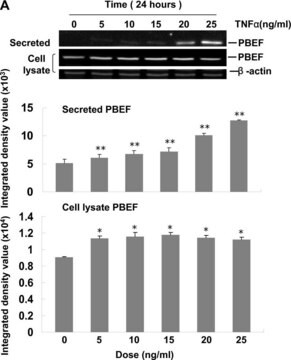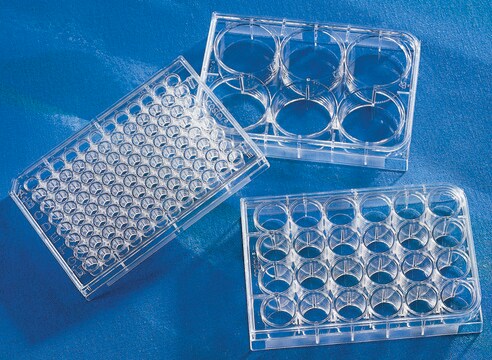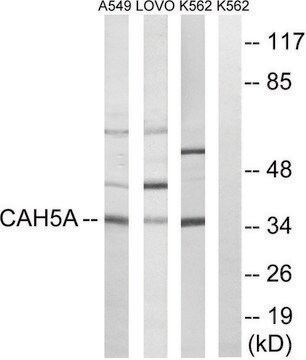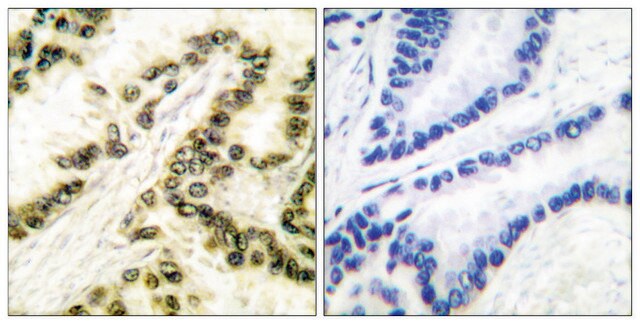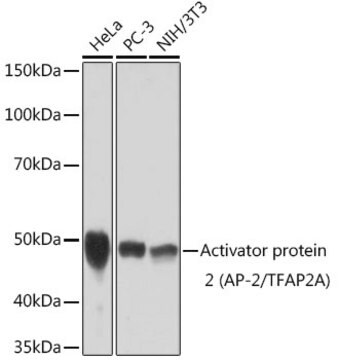推薦產品
生物源
mouse
品質等級
共軛
unconjugated
抗體表格
purified immunoglobulin
抗體產品種類
primary antibodies
無性繁殖
A6/2/2, monoclonal
形狀
buffered aqueous solution
分子量
antigen ~50 kDa
物種活性
human
濃度
~1.0 mg/mL
技術
immunohistochemistry: suitable
western blot: 2-4 μg/mL using G361 total cell extract
同型
IgG1
UniProt登錄號
運輸包裝
dry ice
儲存溫度
−20°C
目標翻譯後修改
unmodified
基因資訊
human ... TFAP2A(7020)
一般說明
Adaptor protein-2 (AP2) is a key constituent of clathrin-coated vesicles that mediates the endocytosis of cell membrane components such as G protein-coupled receptors (GPCRs). AP2 is a heterotetramer that consists of α, β, μ and σ subunits which bind to tyrosine- and dileucine-based motifs on membrane-associated cargo proteins.
Monoclonal Anti-AP2 (mouse IgG1 isotype) is derived from the hybridoma A6/2/2 produced by the fusion of mouse myeloma cells and splenocytes from BALB/c mice immunized with a peptide corresponding to amino acids of human AP2α. In humans and mice, the adaptor protein-2 (AP2) family comprises five different transcription factors namely AP2α, AP2β, AP2 γ, AP2δ, and AP2ε. These proteins contain N-terminal transactivation domain and C-terminal helix-span-helix motif, which together with a central basic region facilitates dimerization and DNA binding.
免疫原
peptide corresponding to amino acid 415-433 of human AP2α.
應用
Monoclonal Anti-AP2 antibody produced in mouse has been used in:
- immunofluorescence staining
- immunoblotting
- immunohistochemistry
生化/生理作用
Adaptor protein-2 (AP2) expression is associated with the embryonic development. AP2β was found to be a tumor specific human telomerase reverse transcriptase (hTERT) promoter activator, suggesting it may be a biomarker for cancer diagnosis or as a cancer therapeutic target for inhibiting hTERT activity and tumor cell growth. In humans, mutations or loss of these genes result in increased tumor growth and metastasis. Specifically, AP2α loss causes down regulation of E-cadherin and matrix metallopeptidase 9 (MMP-9) activity, which in turn enhance tumorigenicity of colon cancer cells. This effect may also be the result of AP2α regulation by p53.
外觀
0.01M 磷酸缓冲盐溶液,pH 7.4,含 15mM 叠氮化钠。
免責聲明
Unless otherwise stated in our catalog or other company documentation accompanying the product(s), our products are intended for research use only and are not to be used for any other purpose, which includes but is not limited to, unauthorized commercial uses, in vitro diagnostic uses, ex vivo or in vivo therapeutic uses or any type of consumption or application to humans or animals.
未找到適合的產品?
試用我們的產品選擇工具.
儲存類別代碼
10 - Combustible liquids
閃點(°F)
Not applicable
閃點(°C)
Not applicable
分析證明 (COA)
輸入產品批次/批號來搜索 分析證明 (COA)。在產品’s標籤上找到批次和批號,寫有 ‘Lot’或‘Batch’.。
Tumor-specific activation of human telomerase reverses transcriptase promoter activity by activating enhancer-binding protein-2$\beta$ in human lung cancer cells
Deng WG, et al.
The Journal of biological chemistry, 282(36), 26460-26470 (2007)
AP-2alpha and AP-2gamma are transcriptional targets of p53 in human breast carcinoma cells
Li H, et al.
Oncogene, 25(39), 5405-5405 (2006)
Loss of AP-2alpha results in deregulation of E-cadherin and MMP-9 and an increase in tumorigenicity of colon cancer cells in vivo.
Schwart B, et al.
Oncogene, 26(28), 4049-4049 (2007)
Roles of telomeres and telomerase in cancer, and advances in telomerase-targeted therapies
Jafri MA, et al.
Genome Medicine, 8(1), 69-69 (2016)
Li E Yang et al.
Journal of the American Society of Nephrology : JASN, 16(10), 2890-2896 (2005-08-19)
During acute hypertension, Na(+)/H(+) exchangers (NHE3) retract from top to base of proximal tubule microvilli (MV) and Na(+) reabsorption decreases in proximal tubule. This study aimed to determine whether the actin-based motor myosin VI coordinately retracts with NHE3 in response
我們的科學家團隊在所有研究領域都有豐富的經驗,包括生命科學、材料科學、化學合成、色譜、分析等.
聯絡技術服務
